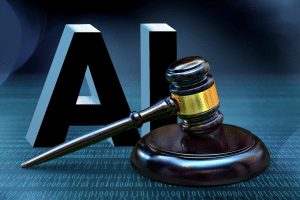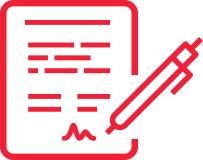Menu
What’s new in artificial intelligence and IP law?
January 27th, 2025

Here’s a roundup of recent developments in artificial intelligence and intellectual property (IP) law.
Former AI Company Employee Says It Violates Copyright Law
A former employee of OpenAI published an essay in which he claimed that his former employer violated US copyright law.
The New York Times reported that Suchir Balaji worked for OpenAI for almost four years.
During those years, he didn’t question whether the company had the right to use third-party copyrighted material to train its generative AI (GAI) tools.
However, after the release of ChatGPT in late 2022, he concluded that the use of the copyrighted data violated the law, in his opinion, and that GAI technologies like ChatGPT were harming the internet. He then left the company.
GAI, when provided a prompt by a user, can “create” text, images, music, and other previously nonexistent content. A GAI tool is “trained” to do this by being fed vast quantities of pre-existing text, images, music, and other content. It sometimes replicates that content, and sometimes combines elements of it in new ways.
The training content is commonly protected by copyright law and owned by third parties. Sometimes, the content is licensed by the owners to AI companies for training purposes, but often it’s used without permission.
As the Times explains,
OpenAI, Microsoft, and other companies have said that using internet data to train their A.I. systems meets the requirements of the “fair use” doctrine. The doctrine has four factors. The companies argue that those factors — including that they substantially transformed the copyrighted works and were not competing in the same market with a direct substitute for those works — play in their favor.
Balaji also said he was worried about AI “hallucinations” – the ability of GAI to produce false and invented “facts.”
In a tragic turn of events, Balaji was recently found dead in his San Francisco apartment. On November 25, one day before police found Balaji’s body, a court filing named the former OpenAI employee in a copyright lawsuit brought against the startup.
Blade Runner Movie Company Sues Tesla for AI Infringement
Alcon Entertainment, a producer of Blade Runner 2049, has sued Tesla and Elon Musk for alleged copyright infringement.
According to the complaint,
Defendants requested permission to use an iconic still image (Exhibit A) from Alcon’s “Blade Runner 2049” motion picture (“BR2049” or the “Picture”) to promote Tesla’s new fully autonomous cybercab in an October 10, 2024 event that was livestreamed worldwide from WBDI’s Burbank, California studio lot. Alcon refused all permissions and adamantly objected to Defendants suggesting any affiliation between BR2049 and Tesla, Musk, or any Musk-owned company. Defendants then used an apparently AI-generated faked image to do it all anyway.
The complaint also alleges that
Defendants apparently fed the Exhibit A Image and similarly iconic images from the same visual sequence at BR2049’s dramatic core (Exhibit B) into an AI-driven image generator and then directed the AI to make a lightly stylized fake screen still from BR2049 (Exhibit C). Defendants then made this faked image the second presentation slide of the event, displaying it full screen on the livestream feed for 11 seconds (a marketing and advertising eternity) at the opening of Musk’s cybercab sales pitch remarks.
Tesla introduced 50 of its cybercabs at an event in October, and Tesla said it would be selling them within three years.
Microsoft’s CEO Wants to Change Copyright Laws
Microsoft CEO Satya Nadella recently asked countries to reconsider copyright laws at an event in London, according to The Times of London.
“If everything is just copyright,” he said, “then I shouldn’t be reading textbooks and learning because that would be copyright infringement.”
Nadella said he was “delighted” by Japan’s approach to AI and copyright law. Japan has become one of the world’s most AI-friendly countries by “allowing companies to ingest and use copyrighted works for any type of information analysis, including training AI models.”
Dow Jones Sues AI Startup for Copyright Infringement
Dow Jones, the publisher of The Wall Street Journal and The New York Post, has filed a copyright infringement lawsuit against AI startup Perplexity.
According to the complaint,
Perplexity is a generative artificial intelligence company that claims to provide its users with accurate and up-to-date news and information in a platform that, in Perplexity’s own words, allows users to “Skip the Links” to original publishers’ websites. Perplexity attempts to accomplish this by engaging in a massive amount of illegal copying of publishers’ copyrighted works and diverting customers and critical revenues away from those copyright holders. This suit is brought by news publishers who seek redress for Perplexity’s brazen scheme to compete for readers while simultaneously freeriding on the valuable content the publishers produce.
The complaint charges that.
Perplexity loudly touts that its answers to user queries are so reliable that its users can “Skip the Links” to the original publishers and instead rely wholly on Perplexity for their news and analysis needs. What Perplexity does not tout is that its core business model involves engaging in massive freeriding on Plaintiffs’ protected content to compete against Plaintiffs for the engagement of the same news-consuming audience and, in turn, deprive Plaintiffs of critical revenue sources.
The plaintiff claims that Perplexity also harms its brands by falsely attributing to the Plaintiffs content that the Plaintiffs never wrote or published:
Not infrequently, if Perplexity is asked about what Plaintiffs’ publications reported, Perplexity “answers” with false information. AI developers euphemistically call these factually incorrect outputs “hallucinations.” Perplexity’s hallucinations can falsely attribute facts and analysis to content producers like Plaintiffs, sometimes citing an incorrect source, and other times simply inventing and attributing to Plaintiffs fabricated news stories.
Open AI Announces Approach to Patent Rights
OpenAI has published a short blog post, "Our Approach to Patents.” It states that:
We support the efforts of others in the use and development of AI model technology. We pledge to only use our patents defensively, so long as a party does not threaten or assert a claim, initiate a proceeding, help someone else in such activities against us, or engage in activities that harm us or our users.
In other words, the company is claiming that it won’t “shoot first” when it comes to claims of infringement of its patents but will only assert its own patent rights against others who claim OpenAI has infringed their patent rights.
OpenAI is a former non-profit turned for-profit entity that’s 49% owned by Microsoft.
Categories: Copyright








